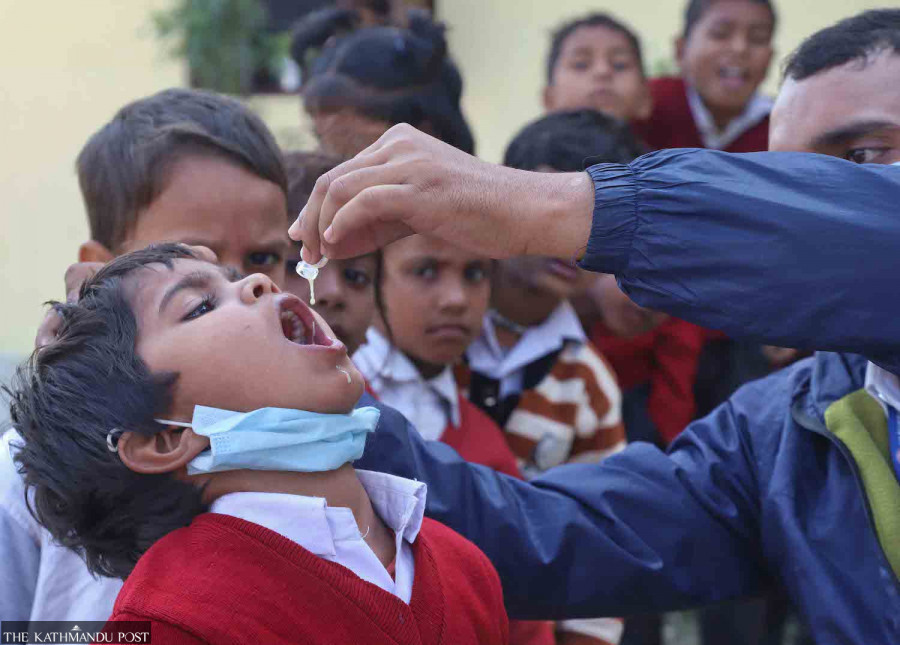
News
October 11, 2025
Anti-cholera immunisation drive to kick off next week
Over 1 million people above one year of age from Parsa and six local units of Bara will be administered oral cholera vaccine.
A large-scale anti-cholera immunization campaign is set to begin next week, targeting over one million residents in Parsa district and six local units of neighboring Bara district. The initiative aims to protect vulnerable populations from the potentially deadly waterborne disease, particularly as the monsoon season approaches and increases the risk of outbreaks.
The oral cholera vaccine (OCV) will be administered to individuals aged one year and older. This broad age range is crucial for maximizing the impact of the vaccination drive and creating widespread community immunity. Health officials emphasize that even young children, who are often more susceptible to severe illness, need to be protected.
The campaign comes at a critical time. Cholera, a bacterial infection usually spread through contaminated water or food, can cause severe dehydration and even death if left untreated. Areas with poor sanitation and limited access to clean water are particularly vulnerable. Parsa and Bara districts, like many regions in Nepal, face ongoing challenges in providing adequate water and sanitation infrastructure, making preventative measures like vaccination all the more important.
Public health workers are currently being trained to administer the vaccine safely and effectively. The training includes proper storage and handling of the vaccine, as well as techniques for engaging with the community and addressing any concerns people may have about the immunization process. Local health posts will serve as key vaccination sites, and mobile teams will be deployed to reach more remote and underserved communities within the target areas.
Authorities are urging residents to participate in the campaign and avail themselves of the free vaccine. Community leaders and local influencers are also being enlisted to promote the importance of vaccination and encourage widespread participation. Health officials are hopeful that this ambitious immunization drive will significantly reduce the risk of cholera outbreaks in the region and protect the health and well-being of the community. The success of the campaign relies heavily on the active involvement of the public, ensuring that as many eligible individuals as possible receive the life-saving vaccine.
The oral cholera vaccine (OCV) will be administered to individuals aged one year and older. This broad age range is crucial for maximizing the impact of the vaccination drive and creating widespread community immunity. Health officials emphasize that even young children, who are often more susceptible to severe illness, need to be protected.
The campaign comes at a critical time. Cholera, a bacterial infection usually spread through contaminated water or food, can cause severe dehydration and even death if left untreated. Areas with poor sanitation and limited access to clean water are particularly vulnerable. Parsa and Bara districts, like many regions in Nepal, face ongoing challenges in providing adequate water and sanitation infrastructure, making preventative measures like vaccination all the more important.
Public health workers are currently being trained to administer the vaccine safely and effectively. The training includes proper storage and handling of the vaccine, as well as techniques for engaging with the community and addressing any concerns people may have about the immunization process. Local health posts will serve as key vaccination sites, and mobile teams will be deployed to reach more remote and underserved communities within the target areas.
Authorities are urging residents to participate in the campaign and avail themselves of the free vaccine. Community leaders and local influencers are also being enlisted to promote the importance of vaccination and encourage widespread participation. Health officials are hopeful that this ambitious immunization drive will significantly reduce the risk of cholera outbreaks in the region and protect the health and well-being of the community. The success of the campaign relies heavily on the active involvement of the public, ensuring that as many eligible individuals as possible receive the life-saving vaccine.
Category:
Politics